 Last additions - Kita-Ibaraki Arts and Crafts 北茨城伝統工芸 Last additions - Kita-Ibaraki Arts and Crafts 北茨城伝統工芸 |
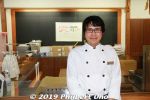
Our dorayaki teacher and Tengokoro store manager.Mar 22, 2019
|
|

The final step is to spread some azuki bean paste on one side and compress it into a sandwich. Way more delicious than any dorayaki you buy in a store.Mar 22, 2019
|
|
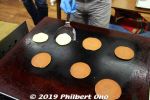
Dorayaki is like a small pancake sandwich with azuki bean paste in between. Wait until the batter bubbles and flip it over. Perfect each time. The dorayaki batter is very different from pancake batter.Mar 22, 2019
|
|
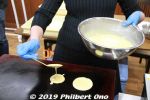
At Tengokoro, you can make your own dorayaki with azuki bean paste. The shallow ladle contains the perfect amount of batter to make one pancake. Mar 22, 2019
|
|
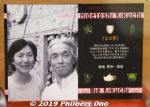
Kikuchi Hidetoshi and wife Mie.Mar 22, 2019
|
|
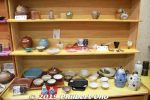
Pottery by our teacher, Kikuchi Hidetoshi and wife Mie.Mar 22, 2019
|
|
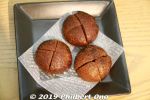
Karinto manju from Kita-Ibaraki.Mar 22, 2019
|
|

Karinto manju.Mar 22, 2019
|
|

An-chan on a cup of sake.Mar 22, 2019
|
|
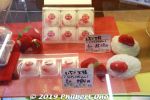
Strawberry daifuku is a specialty of Kita-Ibaraki. Made with locally-grown strawberries. Ibaraki is also a major producer of melons in Japan.Mar 22, 2019
|
|
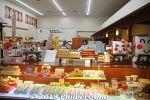
Inside Tengokoro.Mar 22, 2019
|
|

Tengokoro, for local gifts and products. てんごころ http://www.tengokoro.com/Mar 22, 2019
|
|
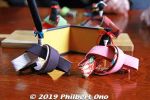
Very simple to make. Tie the two bands into a knot, then stick the head (pin) into it. Did it in 2 minutes. Prince on the left, princess on the right.Mar 22, 2019
|
|
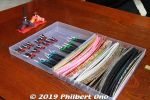
They taught us how to make Hina ningyo dolls for Girl's Day (March 3). We could pick any of these plastic pins and decorative bands for our Hina dolls. Yes, that's all we needed to make the dolls.Mar 22, 2019
|
|
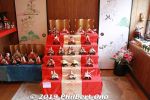
The gallery had Hina dolls for Girl's Day.Mar 22, 2019
|
|
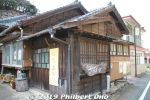
Gallery Salamat Po. "Salamat Po" means "Thank you" in Tagalog. (ぎゃらりー さらま・ぽ) (ぎゃらりー さらま・ぽ)Mar 22, 2019
|
|
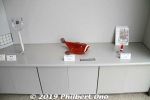
Glass Studio Silica with a glass sculpture of monkfish.Mar 22, 2019
|
|

Glass Studio Silica main exhibition room. ガラス工房シリカMar 22, 2019
|
|
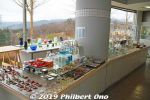
Glass Studio Silica gift shop. ガラス工房シリカMar 22, 2019
|
|
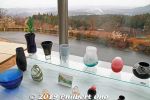
Silica Glass Museum is on a hill with great views of the city. Also offers hands-on glass-making lessons. http://www.studiosilica.com/Mar 22, 2019
|
|
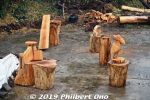
Chain saw sculptures.Mar 22, 2019
|
|
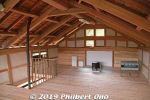
Former horse stable's attic will become a gallery space.Mar 22, 2019
|
|
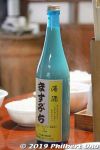
Local sake, a type called Doboroku (どぶろく) or nigori-zake (濁り酒). It's thick and cloudy-white. Sour taste. Made by a local brewer and restaurant named Masubuchi (増渕魚園).Mar 22, 2019
|
|
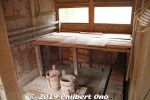
Former horse stable.Mar 22, 2019
|
|

Our table for lunch in the main room of Arigatee.Mar 22, 2019
|
|
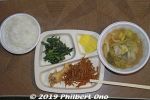
Our lunch at Arigatee. Chicken drumstick, vegetables, rice, and tonjiru (pork and vegetables) soup.Mar 22, 2019
|
|
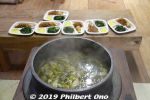
The miso soybean paste in the tonjiru pork miso soup was made by Sumi-chan, a "miso meijin" (味噌名人) or expert miso cook. Mar 22, 2019
|
|

Ishiwata Chifumi and Sumi-chan.Mar 22, 2019
|
|
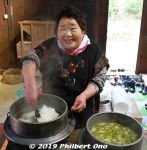
At Arigatee, we were charmed by the delightful Sumi-chan, a retired local farmer. She helped cook our lunch. Rice locally grown in Kita-Ibaraki. Thank you Sumi-chan for smiling!Mar 22, 2019
|
|

Arigatee's current caretaker is Ishiwata Norio and his wife Chifumi (石渡のりお・ちふみ). They moved here from Tokyo. He uses it as a artist studio. That's his painting on the wall.Kita-Ibaraki is promoting itself as an art city, and Arigatee is part of the project. Ishiwata-san and his wife were very gracious and a real boon to the city's artist community.Mar 22, 2019
|
|
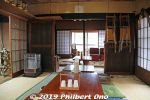
Arigatee is 150 years old built in the late Edo Period. This house will be accepting artist-in-residence as well.Mar 22, 2019
|
|
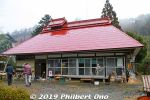
Former farmhouse converted into an artist's studio and gallery called "Arigatee" (pronounced "Ariga-tay" ありがてえ). It means "thankful" (arigatai) in the local dialect. It's also named after the former owner Mar 22, 2019
|
|

We were treated to refreshments served in the Kikuchis' pottery. Confection of azuki bean soup with a piece of mochi. Thank you to Hidetoshi and Mie Kikuchi (菊池 秀利・美恵) for teaching us pottery and hosting us in their beautiful, Japanese-Mar 22, 2019
|
|
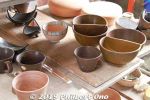
Kikuchi's pottery.Mar 22, 2019
|
|

Kiln is in a another small building.Mar 22, 2019
|
|
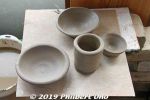
From one clump of clay, I made all these pieces. Oh yeah, it's easy. Anybody can do it. It costs a few thousand yen per piece to color and fire. It is sent to us later.Mar 22, 2019
|
|
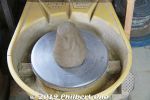
We each got a clump of clay, enough to make several cups or bowls.Mar 22, 2019
|
|
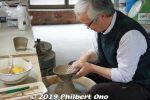
We visited his modest studio for a hands-on pottery lesson. First he demonstrated what we have to do. He made it look so quick and easy. 土の夢陶房 (菊池 秀利・美恵)Mar 22, 2019
|
|
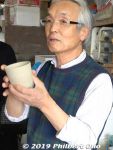
This is Kikuchi Hidetoshi, a local potter who, along with his wife Mie, taught us how to make Izura Tenshin-yaki pottery (五浦天心焼). They moved here in 1998.The Kikuchis are one of several Tenshin-yaki potters in Kita-Ibaraki.Mar 22, 2019
|
|
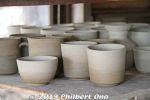
Local pottery called Izura Tenshin-yaki started about 25 years ago by the local Chamber of Commerce. Clay called "gairome" (蛙目) found locally is used. The clay is found in this area under the coal deposits. They collect the clay already exposed on the ground (no digging). This type of clay contains quartz, but the large quartz pieces are removed for pottery.Mar 22, 2019
|
|
|
|